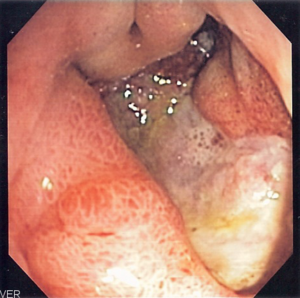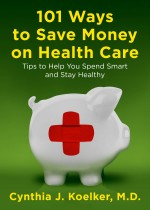
- Image by BlueSe7en via Flickr
Since they work so well for heartburn and other symptoms of stomach acid disease, why not use them all the time? There’s no harm, is there?
As it turns out, there is. One problem recognized quite early was that the use of PPIs can disguise a cancerous stomach ulcer. Anyone who needs to take these medications on a regular basis should be evaluated for the exact cause of the problem. It may well be typical reflux, but if you have a cancerous ulcer, you require cancer treatment, not heartburn treatment.

- Image via Wikipedia
- Using a proton pump inhibitor during the first three months of pregnancy may increase the risk of certain cardiac birth defects (malformations of the heart).
- Second, the use of proton pump inhibitors appears to increase the risk of a recurrent c. difficile infection. Anyone who’s suffered this diarrheal illness once will not care to repeat the experience.
- Thirdly, postmenopausal women who take these drugs may have an increased risk for fractures of the wrist, forearm, and spine (but perhaps not hip).
All this goes to say that even though these drugs work great for symptoms of acid-related disease, they may not be good to take on a chronic basis. You may find you don’t requre these medications if you watch your diet, avoid spicy food, fatty food, acid foods such as citrus and tomatoes, fried food, caffeine, coffee, colas, mint, and any other food you find irritating. Some people are able to reduce their nighttime symptoms merely by elevating the head of the bed, not eating late, and not lying down after exercise. Many patients suffer much less heartburn by eating less, losing weight, and stopping tobaccaso use.
I remember medicine in the days before the PPIs. Apparently people can and did live without these drugs. Certainly, however, ulcer patients have enjoyed a great improvement in their symptoms since the advent of these drugs. But that does not translate into using them so that you can enjoy donuts, spaghetti, and oversize coffees and colas.
If you are taking these medications on a prolonged basis, ask your doctor if you would be better off making lifestyle modifications, or perhaps using them only as needed, or maybe changing to a different type of medicine altogether.

- Image by pumpkincat210 via Flickr
Related articles by Zemanta
- Heartburn Headache: Overuse of Acid Blockers Poses Health Risks (scientificamerican.com)
- How to Get Your Doctor to Help You Stockpile Medicine, by Cynthia J. Koelker, MD (survivalblog.com)
- Peptic ulcer – All Information (umm.edu)
- What can I do about my heartburn? (cnn.com)
- Helicobacter pylori – All Information (umm.edu)


